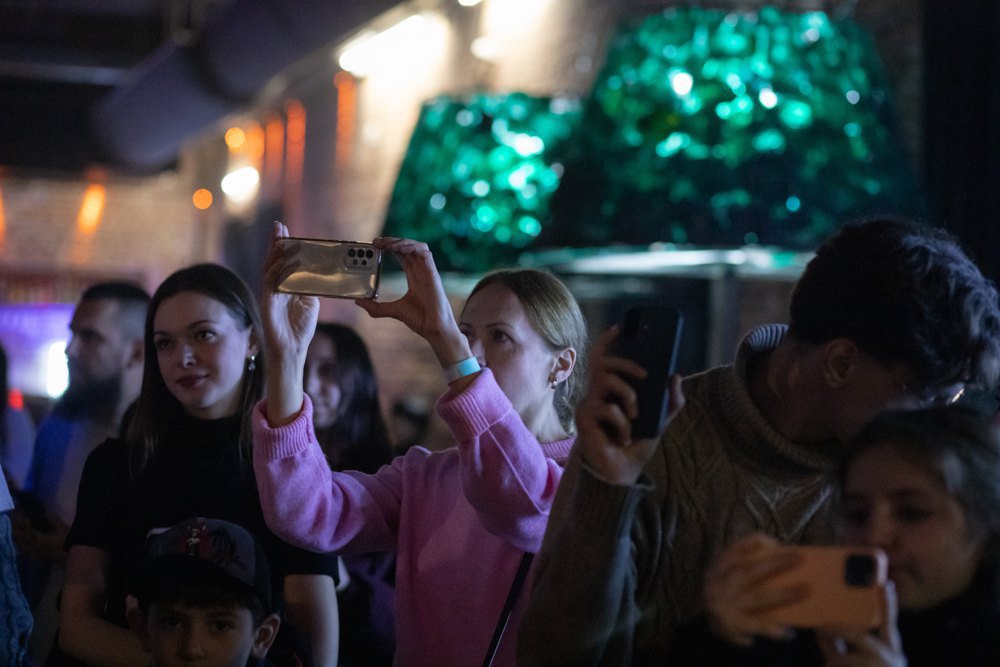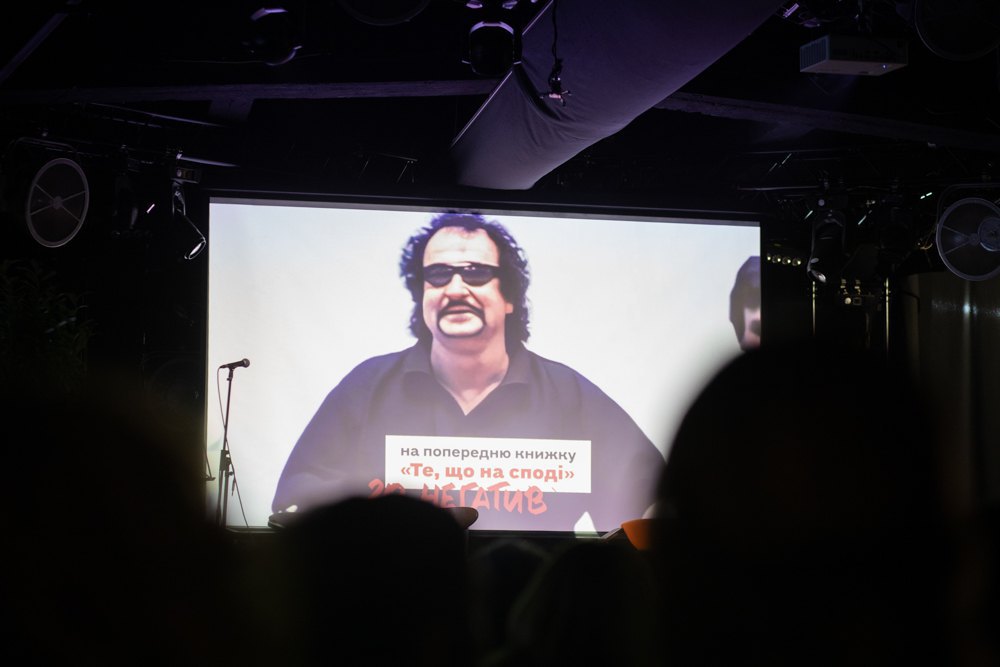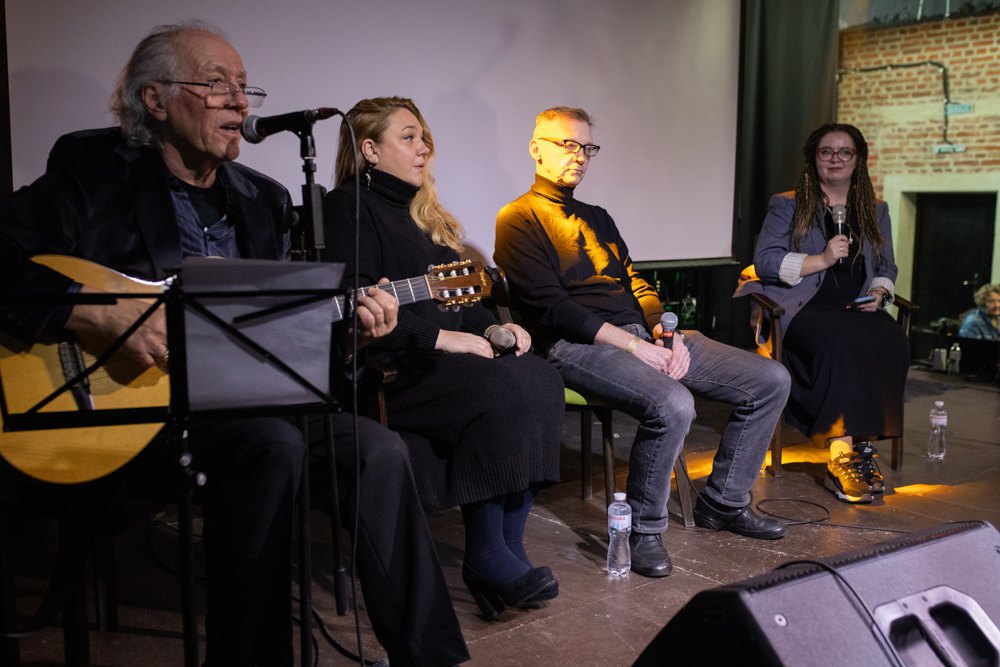
From early morning, hundreds of visitors wander around the venue, drinking coffee, buying books and charity merchandise. The age of the audience is immediately apparent: there are so many young people here – bright, with colourful hair, chunky jewellery and interesting outfits. At first, it seems like you’ve stumbled upon a subculture festival, but then you start to notice other faces – older, even dignified ones.
The festival programme is also diverse and multi-layered, because poetry can take many forms and manifestations. There are morning readings with Serhiy Zhadan and Mariana Savka, performances, slams, and even musical performances. The names of those who were taken by the war are often heard – their voices continue to live on stage.
Events dedicated to those who shaped Ukrainian culture, heralded independence, and often suffered for their beliefs are highlighted: Oleh Lysheha, Hrytsko Chubai, Ihor Kalynets, Vasyl Stus, and Yurko Pokalchuk. Sometimes it seems that these names are distant, but when you talk to those who knew them, you realise that the time is much closer than it seems.
Yurko Pokalchuk, for example, was a best man at Vasyl Stus’s wedding and later became a mentor to an entire generation – Serhiy Zhadan, Irena Karpa, and Lyubko Deresh. Hrytsko Chubay has been gone for over 43 years, but musician and translator Viktor Morozov talks about him and Paco from the stage. It was he and Oleh Lysheha who were expelled from university for participating in the publication Skrynia, which Chubay was preparing. And when you begin to look closely at these intertwined destinies, you realise that you are living in a unique time – you have the opportunity to hear those who stood at the origins of independent culture.

The literary platform Frontiera is currently working with Yurko Pokalchuk – in Lutsk, they plan to create a creative space-residence House of Paco in his family home. The writer is an ambiguous and often controversial figure: he wrote about the country’s development, but at the same time published the first erotic books in Ukraine. He translated from more than ten languages and introduced Ukrainians to Borges, Cortázar, and other world authors.
Solomiya Chubay recalls meeting Paco as a teenager. Their home was always full of guests – now living classics. They gathered, discussed, read works, and stayed overnight. She sat quietly in the corner and absorbed every word, afraid of being sent to bed. She jokes that in the morning she would step over the “bodies” of Andrukhovych, Irvanets, or Pokalchuk. “Back then, I thought that’s how everyone lived,” laughs the musician and cultural manager.
Musician Oleh (John) Suk shared his memories of the joint music project Lights of the Big City. Pokalchuk came up with the name, which was taken from a Charlie Chaplin film. “He had such a tone of voice that he didn’t need strong vocal skills,” says the musician. “Paco defined his style as melodic recitation.” It all started when he took to the stage with the band Mertvyy Piven and read the lyrics – the audience loved it, and so a new project was born.
Solomiya Chubay recalls that she began to communicate more closely with Paco when he and Markiyan Ivashchyn were preparing the book The Lamentations of Jeremiah. “I typed the texts on a typewriter that my father, Hrytsko Chubay, used to use,” she says.

Viktor Morozov also recalls the atmosphere of those years. Once, his friend brought him a copy of Playboy magazine, which contained short stories, so Viktor decided to translate one of them. “Those were the days when Irena Karpa didn’t exist and Serhiy Zhadan didn’t use bad language,” laughs the translator. “I read the stories by Malkovich, Neborak, Andrukhovych and their wives and realised that not everyone was comfortable listening to such texts. I decided that it would be the first and last time I would translate for this magazine.” “And he translated Harry Potter,” adds Solomiya Chubay.
Oleh (John) Suk says that Paco had incredible energy: “When he entered a room, you couldn’t see anyone else but him. When he left, it seemed as if the room was following him.” Paco actively supported young people and travelled to the Pryluky colony, where he published an almanac together with the convicted boys.
All the generations mentioned on stage were multifaceted. The artists tried their hand at different fields. Viktor Morozov recalls that musicians, writers, artists, and translators gathered around Dzyga – they were all part of a single circle that inspired and supported each other. Incidentally, during the event, it became known that Oleh (John) Suk is preparing a collection of short stories.
“Yurko was not just an ingredient, he was a complex, well-balanced dish,” John summed up.
The festival and memories of these people allow us to realise once again that Ukrainian culture was and is part of the global context. We have figures to be proud of and whose stories need to be preserved for inspiration. And the number of people at Land of Poets only confirms that Ukrainians today desperately need to talk about ourselves.







